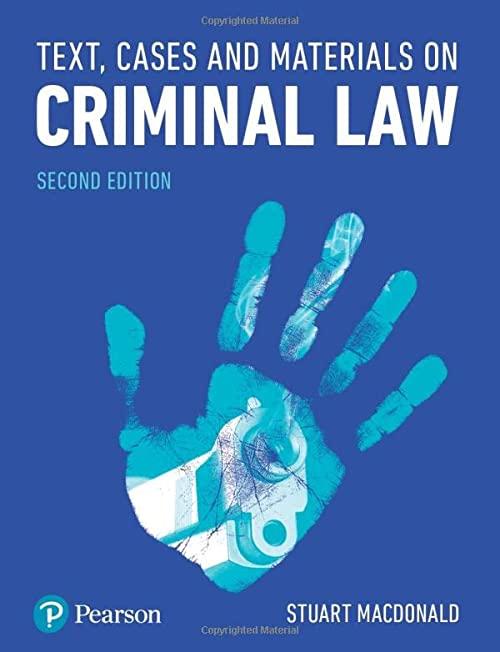Question
Reply to this discussion post: Argersinger v. Hamlin Summary- Argersinger v. Hamlin, the Supreme Court ruled that the Sixth Amendment right to counsel applies to
Reply to this discussion post:
Argersinger v. Hamlin
Summary- Argersinger v. Hamlin, the Supreme Court ruled that the Sixth Amendment right to counsel applies to all criminal cases, including misdemeanors where imprisonment is a possible punishment. The case involved an indigent defendant, Robert Argersinger, who was charged with carrying a concealed weapon in violation of Florida law. Argersinger was not provided with an attorney and was ultimately sentenced to 90 days in jail.
Issue- Argersinger v. Hamlin, decided by the Supreme Court in 1972, addressed a critical issue in the criminal justice system - the right to legal representation for indigent defendants facing misdemeanor charges. The Court ruled that the Sixth Amendment's guarantee of counsel applies to all criminal cases, not just those involving serious offenses.
Holding- Argersinger v. Hamlin is a landmark case in American legal history that addressed the issue of the right to counsel in criminal proceedings. The Supreme Court's decision in this case established that defendants facing even minor criminal charges have a constitutional right to legal representation.
Rationale- Argersinger v. Hamlin, the Supreme Court grappled with the fundamental question of whether a defendant facing misdemeanor charges has the right to legal representation. The Court ultimately ruled in favor of providing counsel for indigent defendants, citing the Sixth Amendment's guarantee of a fair trial and due process.
Step by Step Solution
There are 3 Steps involved in it
Step: 1

Get Instant Access to Expert-Tailored Solutions
See step-by-step solutions with expert insights and AI powered tools for academic success
Step: 2

Step: 3

Ace Your Homework with AI
Get the answers you need in no time with our AI-driven, step-by-step assistance
Get Started


